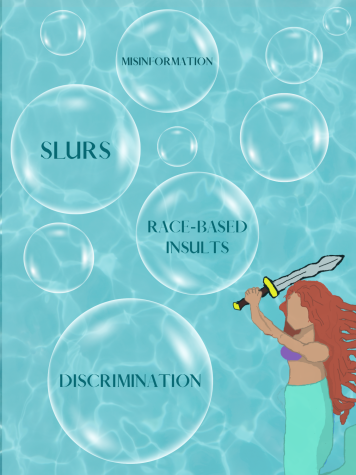Racism Under a Magnifying Glass
December 16, 2022
On the internet, racism is everywhere. No matter the social media platform, it is inevitable that a user will stumble upon some type of discrimination. Whether it’s a Reddit thread or the comments of a YouTube video, anti-Black bigotry pervades the digital forms we use to communicate. The implementation of anonymity only aggravates the issue further.
On Twitter, following Elon Musk’s “takeover” of the social media site in October, the use of the N-word increased by over 500%. Musk promised to bring free speech to the platform, and trolls jumped in to do what they do best — cause problems without anyone ever knowing who they are or what they look like. Musk also unsuspended thousands of accounts previously banned for hate speech or propaganda, which also upticked this massive stream of hate.
The unsavory trend of promoting racism doesn’t just permeate potentially anonymous places like Twitter or Reddit. Social media like TikTok and Instagram — sites that tend to be less anonymous to gain followers — makes it easy to allow racist stereotypes to spread through the rapid dissemination and amplification of misinformation. As both publicity officer of the Black Student Union (BSU) and a regular teenager, junior Nylah Thompson has encountered anti-Black racism and prejudice just by scrolling through her social media feed. One specific occurrence that stood out to her happened after the trailer for Disney’s live-action remake of “The Little Mermaid” was released. Disney received backlash for casting a Black actress as the traditionally white mermaid.

“I didn’t see a problem with [the actress from] ‘The Little Mermaid.’ I thought it was cool. But non-Black people started making jokes and calling her ‘The Little Slave’ and other demeaning names [on TikTok],” Thompson said. “It hurts more because [the actress] sees it. If someone said something racist to me in person, I could handle it then and there, but when it’s said on social media, that stays forever.”
With the implementation of the internet, racism and bigotry have not necessarily become worse than before we moved into the digital age. Still, it has become more accessible to a variety of people. Racism is so ingrained into the internet and social services that it has become normalized to go multiplayer on any lobby game and hear 11 and 12-year-olds scream the N-word and other slurs. And despite TikTok being less than a decade old, tales of people being caught for racist behavior are already as old as time.
In fact, the internet and search engines even tend to sometimes elevate bigoted disinformation — the Google algorithm that promoted propaganda was oft-quoted as some of the factors of mass murderer and white supremacist Dylan Roof’s descent into white supremacy. His story inspired the creation of his new “fans” on social media.
“Technology and social media can amplify racist stuff because people can do it in a more anonymous way. Before, it could be done in an overt way, but it wasn’t by computer, it was face-to-face,” senior principal Jamaal Heavens said. “Everyone having a platform can have benefits, but the [downside to this] can be all sorts of negative stereotypes as well as racism being reinforced.”
Because of the vast differences in the perception of racism online or in person, it’s difficult — as well as pointless — to argue which one is “worse.” It’s just a different type of bigotry. However, Thompson believes that online racism can be generally more enduring than racism that’s face-to-face.
“[It’s] because they’re behind the screen. Nobody can do anything, and they’ll go bar-to-bar with anybody,” Thompson said. “They’ll attack you because they’re behind the screen; you can’t physically do anything to them, and when they argue with you, you tend to look like a bad person.”
Racism on the internet can come in all forms, whether in forums, the comments of a TikTok or Youtube video and so on. For Black teens, repeatedly seeing digital discrimination causes negative effects on mental health as well as lower self-esteem. Recognizing that this type of discrimination exists and has a huge impact on Black people is the first step in creating a more positive community on all online platforms.
